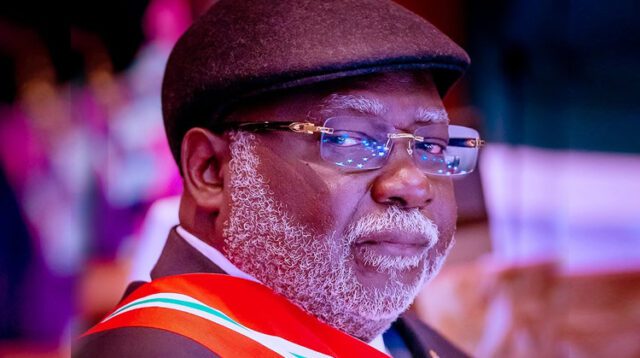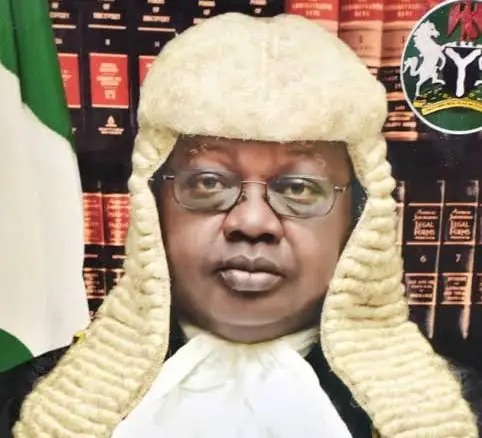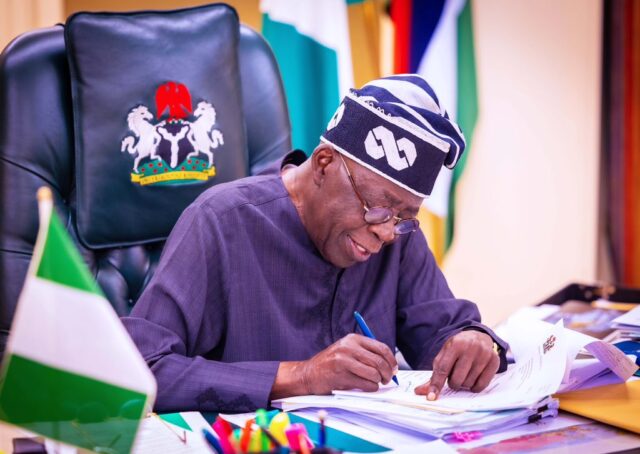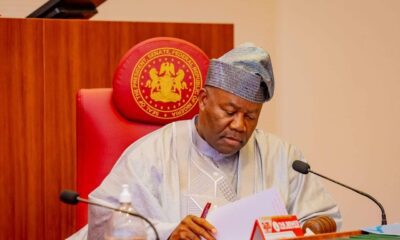National Issues
Is Justice Ariwoola’s Departure Amidst Startling Revelations by Justice Muhammad in Nigeria’s Judiciary an Urgent Necessity? -By John Egbeazien Oshodi
In light of these compelling arguments, Justice Muhammad’s critique serves as a call for immediate action. The time for change is now, and Justice Ariwoola must heed these warnings, step down from his position, and allow for the necessary reforms that will restore faith in Nigeria’s judiciary. Failure to do so risks not only his legacy but also the credibility of the entire judicial system.

In light of Justice Dattijo Muhammad’s alarming revelations about Chief Justice Olukayode Ariwoola’s authoritarian grip, regional biases, nepotism, and politicization within Nigeria’s judiciary, it is imperative for us to openly plea for Justice Ariwoola’s departure. Acknowledging the divine call for justice by Muhammad, immediate action is crucial to signal a new era of integrity, transparency, and fairness in Nigeria’s legal system. The initial step towards this transformation begins with Ariwoola’s prompt exit from the judicial scene.
Justice Musa Dattijo Muhammad, with 47 years of experience on the Nigerian court, fearlessly voiced numerous significant concerns and advocated for crucial judicial reforms during his valedictory presentation at the Supreme Court of Nigeria. He emphasized the necessity for greater inclusion and collaboration among stakeholders in the legal system, particularly in response to the Chief Justice of Nigeria’s concentration of powers. Justice Muhammad called for a more equitable and balanced decision-making system, highlighting the failures of Chief Justice Olukayode Ariwoola in these aspects.
The courage displayed by insiders like Justice Muhammad, who disclosed these concerns even after retirement, initiates vital conversations about accountability, transparency, and ethical behavior within the judiciary. His revelations have paved the way for self-reflection and improvement within the legal system. In light of these serious issues brought to the forefront, isn’t it essential for Justice Olukayode Ariwoola to acknowledge these grave exposés that occurred under his leadership marked by unchecked power and seriously consider stepping down from the legal scene?

Justice Muhammad’s critique resonates with the sentiments of many retired judges who have voiced worries about various aspects of Nigeria’s judicial system, especially under Justice Ariwoola’s tenure. These concerns have extended to financial transparency and corruption within the judiciary, indicating a larger systemic problem that Justice Muhammad has underscored in his address.
A fundamental concern highlighted by Justice Muhammad is the consolidation of power within the Chief Justice of Nigeria, enabling the exercise of ‘absolute powers’ in overseeing the country’s judiciary. This centralization of power has led to decisions contrary to democratic principles and equal representation within the judiciary. Given these revelations, it is incomprehensible why Justice Ariwoola would persist in his office any longer. His departure is crucial for the restoration of integrity and trust within Nigeria’s judiciary.
Furthermore, Justice Muhammad spotlighted concerns within the judiciary regarding the appointment of judges’ “children, spouses, and mistresses” to judicial positions, suggesting that these nominations might be influenced by personal relationships rather than merit. His detailed expose laid bare a judiciary marred by favoritism, nepotism, and cronyism, epitomized by Chief Justice Ariwoola’s alleged appointment of his own son to a judicial position. Such actions are profoundly troubling, demanding immediate action. Justice Ariwoola’s departure is the only fitting response.
Justice Muhammad also expressed concerns about the composition of the Supreme Court panel that deliberated on appeals related to the 2023 presidential election, highlighting doubts about the fairness and integrity of these proceedings. Chief Justice Ariwoola’s exposure is clear, necessitating his immediate resignation from office.
Justice Muhammad’s poignant critique highlighted the declining credibility of Nigeria’s judiciary and the unsettling unpredictability of recent court decisions. He underscored instances of interference by the executive branch, emphasizing the pressing need to restore public faith in the judicial system. Chief Justice Ariwoola’s continued tenure only worsens these challenges. His resignation is imperative to restore the judiciary’s-stained reputation and rebuild the trust of the Nigerian people. The moment for change has arrived, and Justice Ariwoola must respond to this call by resigning promptly, ushering in a new era of integrity, accountability, and justice within Nigeria’s judiciary.
Justice Musa Dattijo Muhammad’s comprehensive assessment sheds light on fundamental challenges confronting Nigeria’s judiciary. He emphasizes the urgent need for equal regional representation, open decision-making processes, and a reevaluation of the extensive powers vested in the office of the Chief Justice of Nigeria (CJN). These issues underscore the crucial requirement for structural reforms to establish a fair, transparent, and efficient court system, vital for upholding the rule of law and democracy in any society.
One critical proposal, echoing previous calls for reform, advocates for the complete decentralization of the National Judicial Council (NJC), allowing each state to have its independent judicial system. Nigeria has outgrown its colonial legacy, and the population’s exponential increase necessitates a more localized approach to judicial governance. The current centralized system hampers efficiency and inclusivity, hindering the judiciary’s ability to address the diverse needs of the nation’s populace.

Musa Dattijo Muhammad
Justice Muhammad criticizes the Chief Justice of Nigeria (CJN) for allegedly excluding Igbo judges from the Supreme Court bench deliberately. He points out the CJN’s excessive authority over key judicial entities and the potential for corruption stemming from such concentrated power. Justice Muhammad’s words serve as a stark warning to Justice Ariwoola, urging him to relinquish his absolute power, sparing himself divine consequences as hinted at in his speech.
Justice Muhammad’s critique sheds light on the intentional neglect of filling vacant positions on the Supreme Court bench, notably from the Southeast and North Central regions. He raises important questions about the Chief Justice of Nigeria’s motives behind this decision, suggesting a misuse of absolute powers. The absence of justices from specific regions not only compromises the court’s ability to deliver unbiased judgments but also raises significant concerns about the overall fairness of the judicial system. In a diverse and multicultural society, such insensitivity is deeply troubling. Considering these factors, isn’t it imperative for Justice Ariwoola to step down from the legal scene?
Justice Muhammad’s apprehensions about the Chief Justice of Nigeria’s vast powers, especially in matters of judge recruitment and discipline, underscore the necessity for collaborative decision-making to curb corruption and power abuse. His resistance to reforms only perpetuates an unjust system, eroding the judiciary’s credibility. In light of this, shouldn’t Ariwoola consider exiting the legal scene, allowing room for new processes to take shape and restore integrity?
Justice Muhammad emphasizes the importance of balanced representation on the Supreme Court bench, advocating for justices from all six geopolitical zones. This diversity is essential for ensuring varied perspectives and impartial judgments, especially in high-stakes cases like presidential appeals. He underscores the importance of justice, honesty, and religious principles within the judiciary, urging a collective effort to rectify the system’s flaws and rejuvenate the institution.
He questions fund allocation and highlights disparities in pay within the judiciary, demanding a thorough investigation. His call for transparency and fairness in financial matters underlines the broader need for accountability within the entire judicial system.
In light of these compelling arguments, Justice Muhammad’s critique serves as a call for immediate action. The time for change is now, and Justice Ariwoola must heed these warnings, step down from his position, and allow for the necessary reforms that will restore faith in Nigeria’s judiciary. Failure to do so risks not only his legacy but also the credibility of the entire judicial system.
Justice Musa Dattijo Muhammad’s fearless critique has illuminated the daunting challenges encumbering Nigeria’s judiciary, bringing to the forefront urgent concerns that demand immediate attention and decisive action. Among the most glaring issues he spotlighted is the troubling trend of judges intertwining with politicians, eroding the boundaries that should exist between the judiciary and the political arena. He eloquently articulated the perilous consequences of such alliances, underscoring their potential to jeopardize the independence and integrity of the judiciary, especially when dealing with politically sensitive cases. This development casts a dark shadow over the credibility of the court, particularly under the leadership of Chief Justice Ariwoola, whose close affiliations with politicians like Oyo State Governor Seyi Makinde and former Governor Nyesom Wike, now the minister of the federal capital territory (FCT), raise serious concerns about impartiality and fairness. We need a chief justice who does not play games with the boundaries that should exist between the judiciary and the political arena. Ariwoola, who is known for his jokes before politicians, it’s time to go and join them. His departure is imperative for the restoration of integrity and trust within Nigeria’s judiciary.
Furthermore, Justice Muhammad brought to light the deeply concerning issue of compromised integrity in judicial appointments. He exposed instances where personal connections and influence peddling took precedence over merit, resulting in the appointment of judges’ relatives. This practice not only undermines the judiciary’s integrity but also erodes the fundamental principles of fairness and competence that the legal system should uphold.
Justice Muhammad’s emphatic call for curtailing the powers vested in the Chief Justice of Nigeria regarding key judicial appointments is a testament to his profound apprehension about the rampant abuse of these extensive powers. He stressed the imperative of addressing this abuse, advocating for a more transparent and accountable appointment process that respects the principles of fairness, merit, and justice.
His decision to speak out after retirement underscores his courage and commitment to upholding the principles of justice. However, his revelations also underscore the urgent need for robust whistleblower protection mechanisms within institutions. These safeguards are indispensable in empowering insiders to step forward, ensuring the detection and resolution of systemic issues that might otherwise remain concealed.
In essence, Justice Muhammad’s revelations constitute a clarion call to action for the Nigerian judiciary. The issues he exposed demand immediate remediation, not only to restore public trust but also to uphold the fundamental tenets of justice, transparency, and accountability within the country’s legal system. A crucial step towards rectifying these deep-seated problems involves Chief Justice Ariwoola acknowledging these concerns and taking bold, decisive measures, which includes his own departure from office, to cultivate a legal environment characterized by fairness, impartiality, and justice for all Nigerians.
In essence, Justice Muhammad’s revelations act as a powerful catalyst for reevaluation and reform within Nigeria’s judiciary, igniting the pursuit of a judicial system firmly grounded in the principles of fairness, justice, and honesty. His courageous actions underscore the pressing need to safeguard the integrity of judicial institutions and cultivate a culture of responsibility within them.
Chief Justice Ariwoola’s acknowledgment of the judiciary’s issues and his promise of remedial measures, while a step in the right direction, cannot fully address the deep-seated problems within the system. The Chief Justice, being the public face of numerous questionable activities within the judiciary due to his wielded absolute power, prompts the pressing question: would it not serve the nation best if Ariwoola departs promptly? His departure is essential to initiate genuine reforms and restore public confidence in Nigeria’s judiciary.
Justice Muhammad’s discourse delved into past instances of corruption and the contentious handling of Supreme Court judges. These flaws have significantly undermined the credibility of the judiciary, emphasizing the imperative for substantial reforms.
The lecture emphasized the paramount importance of transparency, accountability, and fundamental reforms within the Nigerian judiciary. Justice Muhammad’s critique calls for a reevaluation of the Chief Justice of Nigeria’s authority, equitable regional representation, fair funding, and an overhaul of the current judicial system.
Justice Muhammad’s speech brought to light systemic flaws within the Nigerian court system, including unchecked powers, regional disparities, financial inequities, and previous controversies. His statements underscore the urgent need for swift reforms to restore public trust, uphold justice, and ensure the independence and integrity of the court.
In a moral tone, Justice Dattijo Muhammad’s perspective humorously underscores the essential role of public opinion in upholding the relevance and integrity of legal decisions. He cautions that a judiciary indifferent to public sentiment might devolve into a soulless technicality, lacking human empathy. Embracing public input not only builds trust in the legal system but also safeguards the court from becoming a mere mechanical entity. This satire emphasizes the urgency of a responsive judiciary, aligning legal judgments with societal values to avoid being seen as a lifeless technicality, ensuring a legal system that genuinely reflects fairness and justice for the public.In Nigeria, the stark contrast between Justice Muhammad’s emphasis on public sentiment shaping just societies and Chief Justice Ariwoola’s rigid focus on legal technicalities highlights a pressing issue in the country’s judiciary. Ariwoola’s recent efforts to detach judicial decisions from public opinion were evident in the administration of oaths to new judges, emphasizing impartiality while dismissing the influence of public sentiment.
This approach was reflected in a recent presidential election appeal where the court seemingly disregarded public opinion. Ariwoola’s stance raises concerns about his indifference to human emotions and democratic values that should underpin legal decisions. In democratic societies like Nigeria, the law is expected to reflect people’s sentiments and promote justice in line with society’s evolving needs.
Ariwoola’s lack of empathy underscores the urgent need for leadership change within Nigeria’s judiciary. Recognizing the vital role of human emotions and public opinion in justice is crucial. Embracing a legal interpretation that considers the spirit and intent behind the law, as seen in advanced nations like the United States, could lead to more nuanced and fair judgments aligning with justice, fairness, and the sentiments of the Nigerian people. This shift is essential for fostering a legal system that truly serves the populace it aims to protect.
In a unified effort to enhance societal fairness, the legal community must champion justice and transparency, striving for equality for every citizen within the legal framework and preserving Nigeria’s democratic values. Tackling nepotism in judicial appointments is pivotal, necessitating the recall and rescindment of familial nominations to establish a merit-driven system. Urgency is paramount; thus, Chief Justice Ariwoola’s prompt resignation due to perceived bias and failure in upholding judicial neutrality becomes imperative. This step, beyond symbolic, holds the key to restoring the judiciary’s credibility. Collaborative action from the legislature and Nigeria bar Association (NBA) is vital to prevent power concentration, advocating for a balanced distribution of powers within the judiciary.
No individual, including the Chief Justice of Nigeria, should wield unchecked authority; introducing checks and balances procedures is crucial for a democratic and accountable legal system. Safeguarding judicial independence is essential; therefore, the NBA should collaborate with the national assembly to enact legislation shielding judges from external influences, ensuring impartial trials and upholding democratic principles. This moment demands swift action, necessitating joint efforts from the NBA, civil society, psychologists and ethical stakeholders to endorse fairness, transparency, and regional representation. This unified initiative signifies a commitment to constructing a more just society for the coming generations, transcending present challenges and instigating lasting transformation.
Justice Muhammad’s revelations have cast a revealing light on the intricate challenges within Nigeria’s judiciary, urging us to explore the psychological and humanistic factors at play. His impassioned speech didn’t merely expose institutional flaws; it delved into the very core of human values and ethical considerations. Psychologically, his revelations illuminated how power dynamics within institutions can lead to ethical decay and societal distrust.
From a humanistic perspective, Justice Muhammad’s call for reform showcases a deep concern for the well-being of Nigerian society. It embodies genuine empathy, highlighting the crucial role of a just and equitable judicial system in fostering social harmony and individual flourishing. His plea for fairness and transparency underscores the fundamental human need for justice, equality, and moral integrity.

Analyzing these issues through a psychological lens allows us to understand the emotional toll such injustices inflict on individuals and communities. When trust in the judiciary, a cornerstone of democracy, is eroded, feelings of disillusionment and frustration permeate society. From a humanistic standpoint, these revelations emphasize the significance of upholding human dignity, ensuring equal opportunities, and nurturing an environment where trust, compassion, and empathy prevail.
It’s imperative to recognize that no individual, including Justice Muhammad, is without imperfections. However, his courageous act of exposing flaws within Nigeria’s judiciary, despite his own limitations, demonstrates a profound sense of responsibility and moral integrity. His revelations highlight the urgent need for reform, encompassing not only legal and institutional aspects but also societal perceptions of justice, guided by divine principles. While not explicitly demanding Ariwoola’s resignation, he subtly reminded him that his actions are under scrutiny from both moral and divine perspectives. Shouldn’t this accountability prompt Ariwoola to step down, paving the way for a new era of openness, integrity, and respect for the people and the legal community?
The profound impact of Justice Muhammad’s revelations underscores the urgent need for a judicial system rooted in humanity’s noblest aspirations. It is a shared responsibility to heed Justice Muhammad’s call, ensuring that justice, fairness, and accountability form the bedrock of Nigeria’s legal system. While acknowledging that no one is flawless, Justice Muhammad’s resolute commitment to justice serves as a compelling example for all. Given these revelations and the imperative for a new era of integrity and accountability within Nigeria’s judiciary, Justice Ariwoola should, in the interest of our young democracy, tender his departure. This action is pivotal for ushering in positive change, allowing space for transformation and rebuilding public trust. The nation’s progress demands leaders who align with the aspirations of justice, and the courageous voices, like Justice Musa Dattijo Muhammad’s, must be heard to guide us toward a more just and equitable society. May Allah be with you, Justice Muhammad.
Professor John Egbeazien Oshodi, who was born in Uromi, Edo State, Nigeria, to a father who served in the Nigeria police for 37 years, is an American-based police and prison scientist and forensic, clinical, and legal psychologist. A sex offender assessment and treatment psychologist. A government consultant on matters of forensic-clinical psychological services in the USA; and a former interim associate dean and assistant professor at Broward College, Florida. The Founder of the Dr. John Egbeazien Oshodi Foundation, Center for Psychological Health and Behavioral Change in African Settings. In 2011, he introduced state-of-the-art forensic psychology into Nigeria through N.U.C. and Nasarawa State University, where he served in the Department of Psychology as an Associate Professor. He has taught at various universities and colleges including Florida memorial University, Florida International University, Broward college, Lynn University, and a contributing faculty member at the Weldios university in Benin Republic, Nexus International University, Uganda, Nova Southeastern University and Walden University in USA. He is a Human Rights Psychologist with a focus on African related environments. john.oshodi@mail.waldenu.edu

















